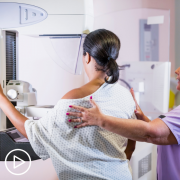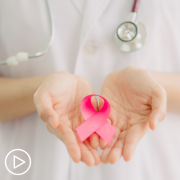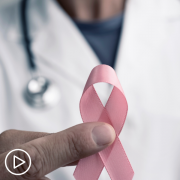What Key Questions Should Newly Diagnosed Breast Cancer Patients Ask Providers?
What Key Questions Should Newly Diagnosed Breast Cancer Patients Ask Providers? from Patient Empowerment Network on Vimeo.
What key questions should breast cancer patients who are newly diagnosed ask their care providers? Dr. Regina Hampton explains vital points to learn about your specific breast cancer to ensure thorough exploration of treatment options and the best care for you.
See More From the Best Care No Matter Where You Live Program
Related Programs:

What Steps Can Breast Cancer Patients Take To Be More Proactive? |

|
Transcript:
Dr. Nicole Rochester:
As a breast surgeon, can you share with us what are some key questions that patients with breast cancer should be asking their team at the beginning of their diagnosis?
Dr. Regina Hampton:
I think it’s important to understand the type of cancer that you have, is it non-invasive, is it invasive, it’s important to know the characteristics of the tumor, is this a hormone-driven tumor, is in a non-hormone-driven tumor or triple-negative tumor? And then to ask in each step, with each discipline with surgery, finding out what are the pros and cons of a lumpectomy versus a mastectomy, when you get to the medical oncologist, finding out the pros and cons of chemotherapy versus hormone therapy, or doing both. How is that delivered? How is this going to affect my daily life? Can I still work if I’m getting chemotherapy? What happens when I get radiation? And what are the options? So, I think it’s just really important to, I’d say, go online and find a list of questions or a lot of great organizations out there that have pointed questions that you should ask each step of the way, many times the navigators will give you booklets and things to read that, have questions. And I think don’t be afraid to turn one visit into two or even three visits to make sure that you’re understanding the options.
I‘m always troubled when I see patients who maybe years ago might have had some options, but they just rushed through and decided maybe to do mastectomy and they say, “You know what, had I really just stopped and thought about it, I might have made a different decision.” So, I think it’s very important, and I feel as the provider, the provider really should know how to read the room and really be able to pick up on the fact that, “You know what, she’s just not here today, and so…I’m going to stop talking. I’m going to send her away, let her digest this, and we’re going to come on back so we can have another conversation.” And I think as providers, we have to not be afraid, and I know it’s hard because time is tied. And we’re trying to see as many patients, but it’s really important to understand that every patient may need something a little bit different, and really trying to hone in on that, I think is really important as a provider, and making sure that you’re heard because a lot of times I think women of color, men of color as well, are not really heard by the doctor, and many of the doctors come in with their own biases and think, “Oh well, she’s young, she’s automatically going to want a mastectomy,” or “She’s old, we’re going to go ahead with a mastectomy,” well, it’s a matter of really listening to the patient and seeing how you can meet in the middle, and if the patient has to get a treatment that they’re not really keen on getting, but you know it’s the right thing to do.
Dr. Regina Hampton:
Again, it’s just having that conversation and dialogue so that they understand your reasoning.
Dr. Nicole Rochester:
Thank you. So, Dr. Hampton, it is evident during this interview, and, of course, I also know you personally and professionally, and you have certainly built a reputation of being a compassionate provider. Clearly, you are very committed to communicating with your patients, but the reality is not all of our colleagues are like Dr. Hampton. And so, I’m thinking about something you said about really kind of pushing back, so to speak, sometimes we have to push back in a polite way with our health care providers, and you mentioned maybe the woman is being faced or the man with treatment recommendations and maybe they have some concerns about that, and I know that not every patient feels comfortable disagreeing with their doctor or even engaging in a dialogue where they want to actually have more conversation. So many people, even in 2021, adopt a paternalistic relationship with their doctor where the doctor says, do this, and then they do it. And so, is there any advice that you can give our listeners our watchers, for when they’re in that situation with their breast surgeon or their oncologist, and they’re just not feeling comfortable, they don’t feel like all of the treatment options are being presented, are there any tips that you can provide for that?
Dr. Regina Hampton:
And in those cases, it’s important to go and get a second opinion, it doesn’t mean that you’re saying that that doctor is not a great doctor, you just may want to hear the information. It could be the same information, just presented it in a different way. All of us kind of explain things a little bit differently, and so I think getting a second opinion is important, and if your first doctor is offended that you’re getting a second opinion, you should fire that doctor. I tell my patients like, this is not my journey, this is not about me, this is really about you. Where do you want to go? We will help you get there, we’ll help you get the appointment, because I think it’s important for patients to have that information, so feel empowered and realize you can ask questions of the doctor, we’ve changed medicine and that…it’s a patient-centered approach. It’s not me. The doctor, I know all it’s…you may come in with a new study, let’s talk about it, and if you don’t have a doctor who’s open to hearing that information, then that might not be the doctor for you.
Dr. Nicole Rochester:
Yes, we have to have that type of relationship with our patients where we’re making joint decisions where the patient and their family members are truly brought in as members of the healthcare team.








